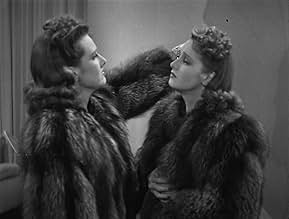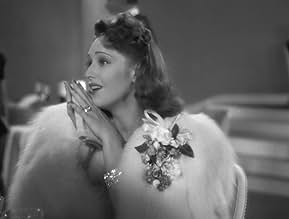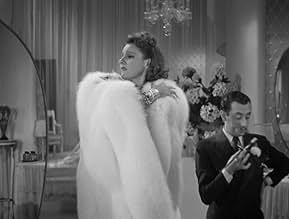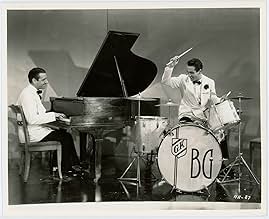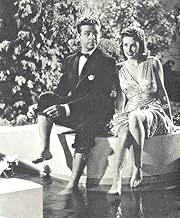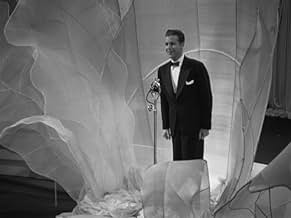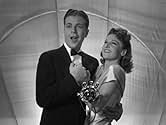Aggiungi una trama nella tua linguaRonny Bowers, a saxophonist in Benny Goodman's band, has won a talent contest and a ten week contract with a film studio. On his first evening he is supposed to go with the studio's star Mon... Leggi tuttoRonny Bowers, a saxophonist in Benny Goodman's band, has won a talent contest and a ten week contract with a film studio. On his first evening he is supposed to go with the studio's star Mona Marshall to a movie premiere. But she doesn't want to go, so the bosses decide to use a ... Leggi tuttoRonny Bowers, a saxophonist in Benny Goodman's band, has won a talent contest and a ten week contract with a film studio. On his first evening he is supposed to go with the studio's star Mona Marshall to a movie premiere. But she doesn't want to go, so the bosses decide to use a double for her: Virginia. When Mona finds out next morning that happened, she insisted to ... Leggi tutto
- Regia
- Sceneggiatura
- Star
- Premi
- 2 vittorie totali
Recensioni in evidenza
The best moments are Goodman's numbers which are nevertheless too few to compensate. They do, however, include a good look at vibraphonist Lional Hampton and premier drummer Gene Krupa, along with a quick peek at jazz trumpeter Harry James. On the other hand, the Raymond Paige version of "Dark Eyes" amounts to a textbook example of gaudy over-orchestration. Still, it gives legendary director Busby Berkeley a chance to swoop his camera around in trademark fashion. The drive-in musical bash is both well staged and unusual, with a few clever touches (the falsetto-voiced thug), but again goes on too long. And of course Berkeley does keep everybody in motion, so if some of the routines get wearisome, at least they never drag. But then he's got to work in a lot of second-rate comedy acts (Herbert, Todd), most of which may raise a chuckle but not much else.
No, in my book, it's a disappointing movie, both patchy and undistinguished, except for the knock-out title tune and a winsome Rosemary Lane. Then again, what other film of the day provided a role for movieland's queen of gossip, Louella Parsons, with a cheerless smile that never seems to fade. Somehow, that seems fitting.
Powell and Parsons debuted the Hollywood Hotel program in 1934 so by 1937 it had its fair share of the radio audience. Powell hosted, sang, and kibitzed with Louella and her movie star guests. With the power she had with her column, she was able to get the various stars to go on and plug their latest films for nothing.
Then the American Federation of Radio Artists stepped in and demanded she pay wages accordingly and they won the case. That ended the Hollywood Hotel program in 1938. Of course both Powell and Louella went on to other radio venues. The whole story is covered in the Tony Thomas book, The Films Of Dick Powell.
But before the plug was pulled this film came out from Powell's home studio of Warner Brothers inspired by the radio program. Powell plays a singer/saxophonist with the Benny Goodman band who gets signed to a Hollywood contract. But when he gets out to Hollywood he gets himself tangled up with an egotistical film star Lola Lane, her lookalike double real life sister Rosemary Lane, and a ham actor in Alan Mowbray.
When Mowbray is called upon to sing in a Civil War epic he's making with Lola Lane, it's Powell's voice they use. Then Mowbray develops a Lina Lamont problem when he's asked to go on the Hollywood Hotel radio program, broadcast from the Hollywood Hotel. That's got the studio in a tizzy. Let's say the problem isn't solved the way it is Singing In The Rain, but Powell's manager Ted Healy proves to be resourceful.
Richard Whiting and Johnny Mercer provide a really nice score for the film. The big hit song comes right at the beginning as the Benny Goodman band with scat singing Johnnie Davis sing Hollywood's anthem, Hooray for Hollywood. My favorite however is Powell and Rosemary Lane singing, I'm Like A Fish Out Of Water. Just listening to Johnny Mercer's lyrics about Ginger Rogers running the Brooklyn Dodgers or Sally Rand without her fan, it's a compendium of American popular culture in the Thirties.
Busby Berkeley does the choreography here and while the film doesn't have the soaring imaginary stuff that his earlier work with Warner Brothers has, the numbers are well staged. Berkeley's big moment is in a drive-in eatery where Powell and Healy have been forced to take jobs. The number starts with Benny Goodman broadcasting from the Hollywood Hotel doing Let That Be A Lesson To You and then at the drive-in Powell, Lane and the entire place start joining in song to the exasperation of owner Edgar Kennedy. And you know what you can expect from Edgar Kennedy exasperation.
Benny Goodman gets to show why he was named the King Of Swing when the band with drummer Gene Krupa and xylophonist Lionel Hampton as part of his ensemble. That together with Frances Langford singing as well. And possibly the last surviving cast member of the group was a fellow who had a small bit as a radio announcer. He died in 2004, but not before he became the 40th President of the United States. Ronald Reagan always credited Dick Powell and Pat O'Brien as being the two guys on Warner Brothers who were the most helpful to an eager young player looking to make his mark.
Hollywood Hotel is one delightful and entertaining motion picture, dated, but charmingly so.
Lo sapevi?
- QuizThe actual "Hollywood Hotel" on which this movie is based, was a Hollywood institution, attracting the likes of Mary Pickford and Douglas Fairbanks to Thursday night dances. It was a sprawling building built at the turn of the century at 6811 Hollywood Blvd. and had formal gardens, grand lobby, two towers and a ballroom. It was the hangout for many stars over the years. It was finally torn down in 1956. The site is now occupied by the new Hollywood-Highland shopping complex and Dolby Theatre, where the Oscars are now presented every year. The film includes shots of the exterior of the hotel, which was no longer prominent at the time of the film.
- BlooperIn the credits, Dick Powell's character is spelled: Ronnie Bowers. But, at the beginning of the film, during the character's "Hooray for Hollywood" send off from St. Louis, banners in the crowd spell his name: Ronny.
- Citazioni
Dress Designer: [referring to her gown] If your fans don't explode when you walk into that premiere tonight, I'll tear it to pieces!
Mona Marshall: Do you really think so, Butch?
- ConnessioniEdited into The Shining Future (1944)
- Colonne sonoreHooray for Hollywood
(1937) (uncredited)
Music by Richard A. Whiting (as Dick Whiting)
Lyrics by Johnny Mercer
Sung by Johnnie Davis and Frances Langford
Performed by Benny Goodman and His Orchestra
I più visti
- How long is Hollywood Hotel?Powered by Alexa
Dettagli
- Data di uscita
- Paese di origine
- Lingua
- Celebre anche come
- Отель 'Голливуд'
- Luoghi delle riprese
- Glendale Grand Central Air Terminal - Grandview Avenue, Glendale, California, Stati Uniti(Ronnie's flight arrives in California)
- Aziende produttrici
- Vedi altri crediti dell’azienda su IMDbPro
- Tempo di esecuzione1 ora 49 minuti
- Colore
- Mix di suoni
- Proporzioni
- 1.37 : 1
Contribuisci a questa pagina


